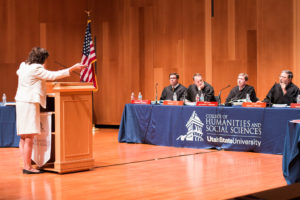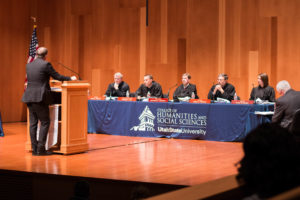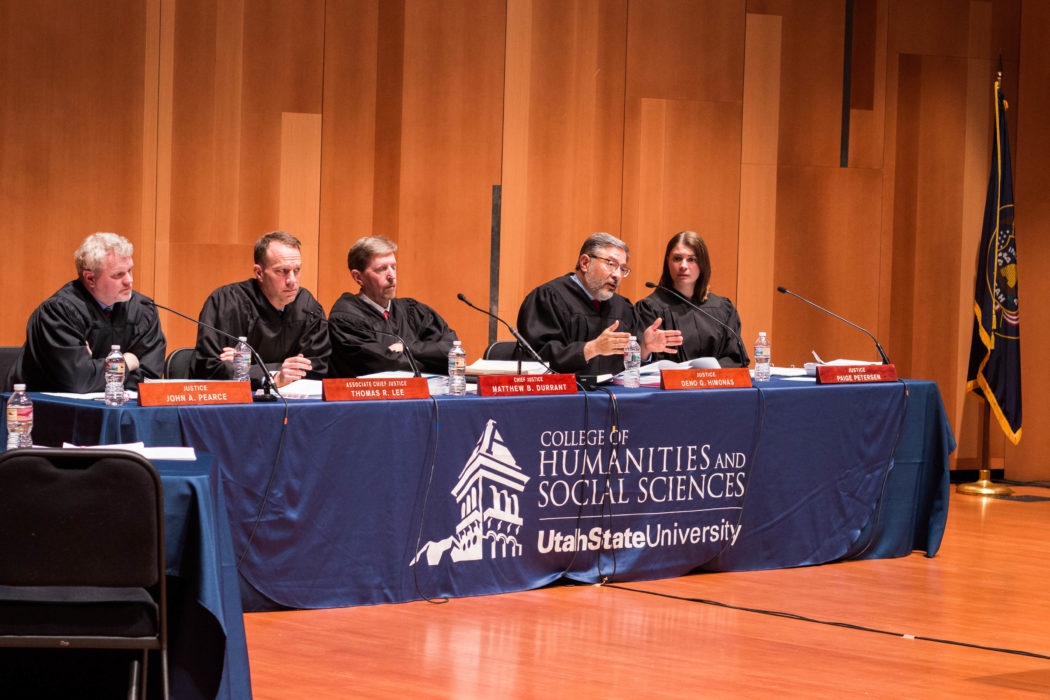Utah Supreme Court hears oral arguments at USU
Editor’s note: Eddie Collins contributed to this report.
The Utah Supreme Court heard oral arguments from a civil and criminal case today on Utah State University Logan’s campus.
“It’s a great opportunity for students to learn more about how government works,” said Joe Ward, the dean of the USU College of Humanities and Social Sciences.
Janelle Hyatt, the director of communications for CHaSS, said the court contacted USU employees and offered to spend a day on campus. They wanted to be involved with students, especially those in law and constitutional studies.
“This could be the start of a new tradition,” Hyatt said.
The Supreme Court meets primarily in the Scott M. Matheson Courthouse, located in Salt Lake City. Neil Abercrombie, USU’s director of Government Relations, said the Utah Supreme Court travels once or twice a year, but usually go to law schools, such as the University of Utah and Brigham Young University.
It was a “unique” experience for USU, Abercrombie said, because USU doesn’t typically host the court.
USU president Noelle Cockett thought the event was “absolutely fascinating” and hoped students felt the same way.
The purpose of student events, Cockett said, is to expose students to possible career choices. After the arguments were heard, the justices held a Q&A with audience members.
First case: State of Utah v. Cooper John Anthony Van Huizen, No. 20170304-SC
Four of the five Utah Supreme Court justices joined 1st District Court Judge Brian Cannell in the Utah State University Russell/Wanlass Performance Hall to hear the oral arguments for the first case.
In the criminal case, 16-year-old John Anthony Van Huizen pled guilty to two counts of aggravated robbery and one count of aggravated burglary. Under the Serious Youth Offender Act, Van Huizen was charged in 2nd District Court, rather than Juvenile Court.

Elizabeth Hunt speaks in front of the Utah Supreme Court at Utah State University Monday, Mar. 19, 2018. Two oral arguments were brought before the Utah Supreme Court and open to the public.
While serving his prison sentence, Van Huizen obtained new legal counsel and appealed the court’s decision to bind him over to the adult system, claiming the judge who bound him over was required to recuse herself because she is married to then-Weber County chief deputy prosecutor. According to court records, the then-prosecutor was not directly prosecuting the case, but did provide advice to prosecutors on the case.
The Utah Court of Appeals ruled in Van Huizen’s favor, overturning the Ogden judge’s decision to charge him in adult court.
Christopher Ballard, assistant solicitor general in the Utah Attorney General’s Office, and defense attorney Elizabeth Hunt presented arguments to the court for about an hour Monday morning.
Ballard argued the Weber County judge was not required to disclose her marriage because it is not considered bias, while Hunt argued Van Huizen’s previous attorney failed to inform the defendant and his parents of the marriage, though it is unclear whether or not the attorney knew.
Second case: Teamsters Local 222 v. Utah Transit Authority, No. 20170208-SC

Troy L. Booher, appellant for Utah Transit Authority, speaks in front of the Utah Supreme Court at Utah State University Monday, Mar. 19, 2018. Two oral arguments were brought before the Utah Supreme Court and open to the public.
All five members of the Utah Supreme Court were present to hear arguments for the second case on the docket, Teamsters Local 222 v. Utah Transit Authority.
The main focus of the civil case is the definition of “employees” as used in the Utah Public Transit District Act. A reclassification of UTA rail operations supervisors from salaried workers to hourly workers was what caused the confusion.
The reclassified supervisors contacted Teamsters Local 222, a labor union that represents employees in industries that affect commerce, to request assistance in organizing a collective bargaining. Teamsters requested to represent the bargaining unit for rail operations supervisors, which UTA denied.
Teamsters then filed a complaint with the district court. The district court ruled in favor of Teamsters in October of 2015, saying that “rail operation supervisors” are “employees” and could organize and collectively bargain. UTA then filed an appeal to the decision.
Troy Booher, the attorney representing UTA, argued to the Utah Supreme Court today that the definition of employees according to the UPTDA was clear and didn’t include supervisors.
Russell Monahan, the representation for the appellee Teamsters Local 222, told the court that the UPTDA didn’t intend to limit employees.
More information on the cases is available at http://chass.usu.edu/court.
—alisonberg28@gmail.com
@alison__berg

